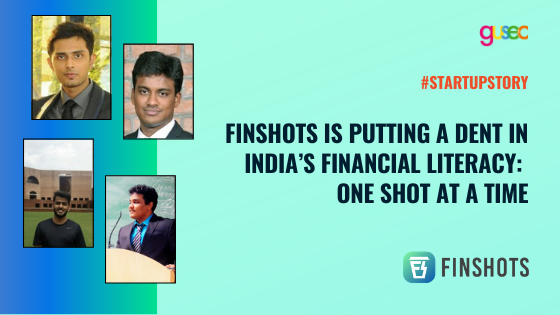Finshots is Putting a Dent in India’s Financial Literacy: One Shot At A Time

When a normal person like me tries to read an article on finance, the way it usually goes is: I begin reading the article, come across a term I don’t understand, Google it, continue reading the article, repeat the aforementioned process a couple more times until the article mentions a fact related to another financial event that I know nothing about. Still determined to finish the article as your first step to understanding finance, I keep going until the article appears to completely evade my understanding, and I give up.
Three Men & An Idea
Pawan, Bhanu & Shrehith felt the same. In 2017, still in their second year of MBA at IIM-Ahmedabad, they conceived the idea for Finshots, a ‘three-minute daily newsletter’ encompassing everything about business and finance in a language that a layman could easily comprehend. Well, that, and the desire to not become a part of the corporate culture and traditional 9-to-5 jobs. Drawing a blueprint of their potential problems and challenges, doing their market research, and experimenting with ideas for Finshots during college, they dreamt of building a source that didn’t headline or sensationalise the news but helped its readers understand the backdrop of a particular financial headline. They were later joined by Bhanu’s brother, Lokesh, who now looks after building technology at Finshots.
What started as a pilot amongst three friends found resonance amongst a lot of readers who embraced Finshots and its offerings. Today, Finshots has amassed about 200,000 subscribers, continuing to simplify business and financial news for its readers, whether it’s about the much-talked-about Google’s 30% tax, or Abenomics – a concept that had always evaded my understanding.
Speaking about their biggest struggles as a startup, Bhanu Gurram, co-founder of Finshots, states, “There were no hindrances in our path, but we barely had any assistance either. IIM-Ahmedabad’s IIMavericks Fellowship Program financed our startup initially, and that allowed us to keep going without having to worry about paying our bills every month. If we didn’t have that, it would’ve been considerably difficult, given that we’re all from middle-class backgrounds.” Still in its nascent stage, Finshots eventually got incubated at GUSEC in October 2018. Being a student startup, they were eligible for the SSIP grant and through GUSEC, leveraged it to sustain their startup. “The SSIP grant helped us stay afloat for another couple of months. Although it wasn’t a big amount, it helped us while we were going through a tough phase of our business.” Bhanu remarks.
The Anatomy of a Startup Founder
“After all your liabilities are taken care of, it’s mostly about whether you’re ready to lead a simple life while all your other batchmates are going on fancy vacations on their 20-25 lac salary packages.” Heading into the startup business, they all knew that it was not going to be easy and that they needed to get used to facing setbacks.
In order to raise money to run operations, the co-founders took up part-time jobs teaching CAT aspirants at TIME & Career Launcher. They would pour in their earnings from the coaching institutes into hiring interns which would allow them to expand their operations and efficiency. “We applied to countless startup incubators, competitions, met VCs and angel investors to get funds, but to no avail. We would count the number of rejections we had every week.”
What Is And What Should be
Bhanu says that trying to establish a startup in a sector that is heavily regulated and thus, has to pass through half a dozen guidelines to get approved, it takes forever to get a license. “If, as a startup, it takes 7-8 months to get one’s license before a startup founder can even start experimenting with what works for my enterprise and what doesn’t, the startup wouldn’t see the light of the day because it’ll be dead in about six months,” Bhanu says that the government needs to understand that unlike traditional companies, startups don’t have the resources to stay afloat for as long, and hence, there is a huge need for regulatory bodies to be proactive while dealing with startups.
In the foreseeable future, Finshots wants to help people make better financial decisions by keeping them informed with the know-how of finance. Bhanu says that people in India do not realise the relevance of financial literacy which is why even graduates from top universities have little idea on how to manage their finances prudently. “We don’t want to tell people what to buy and what not to, but avoid them from being negligent when it comes to financial literacy.”




